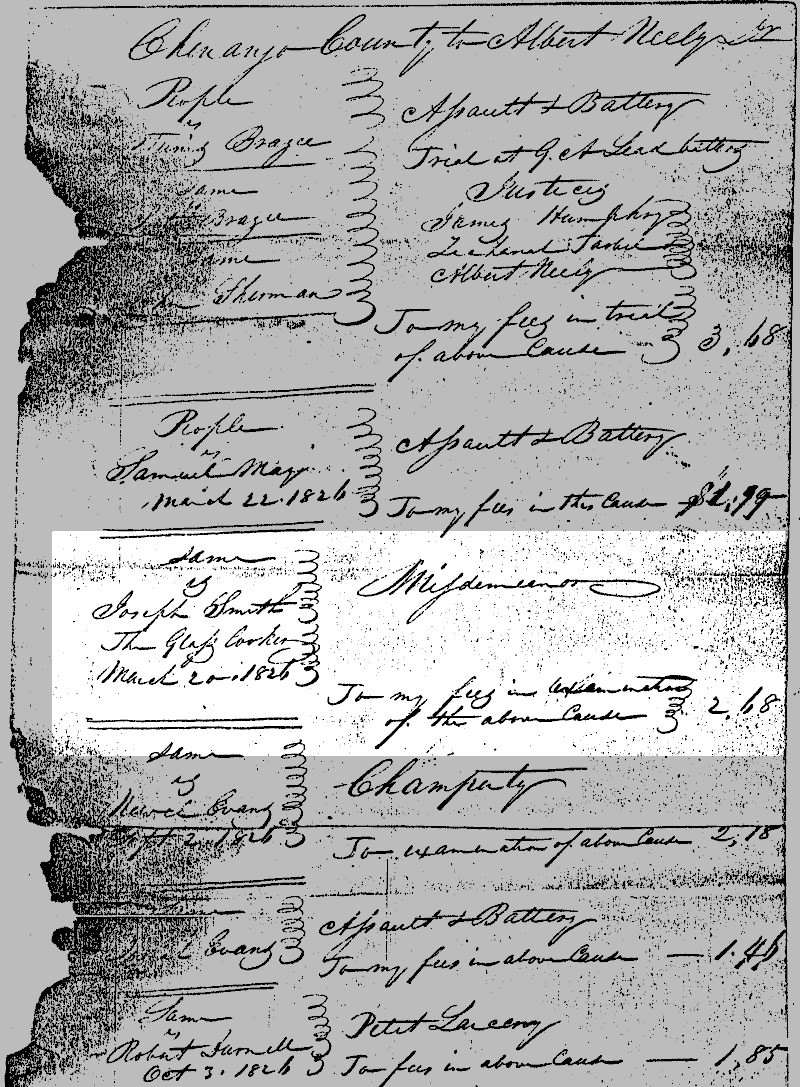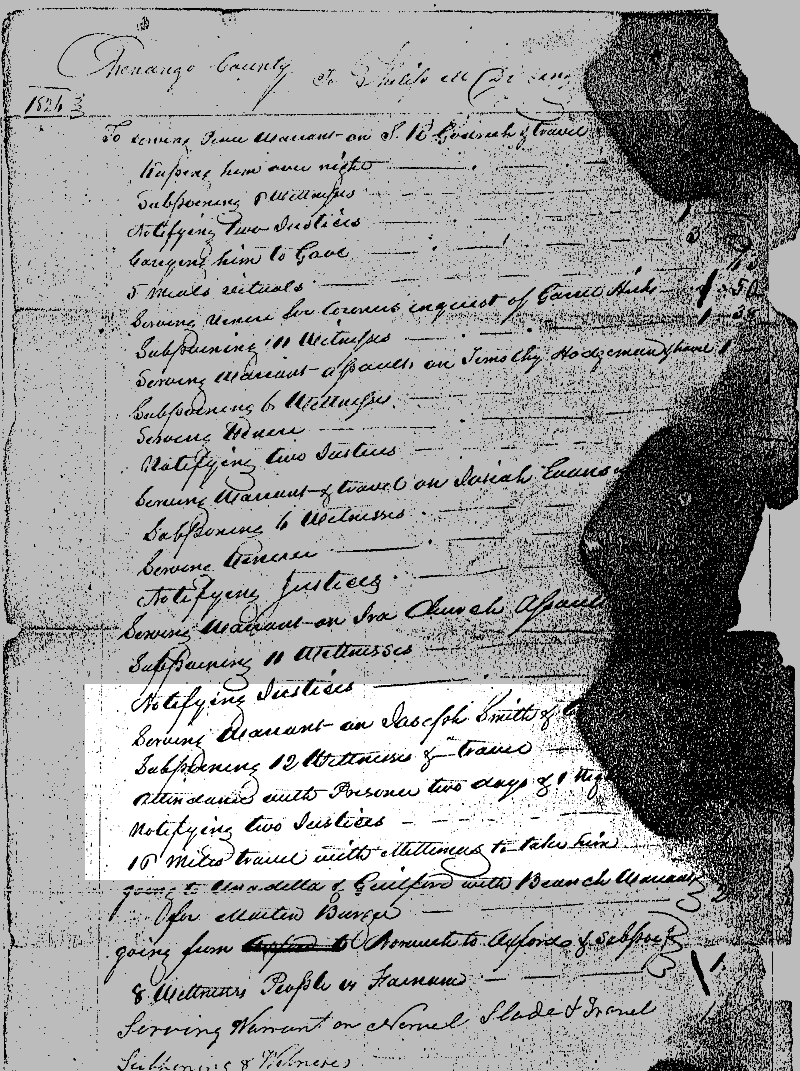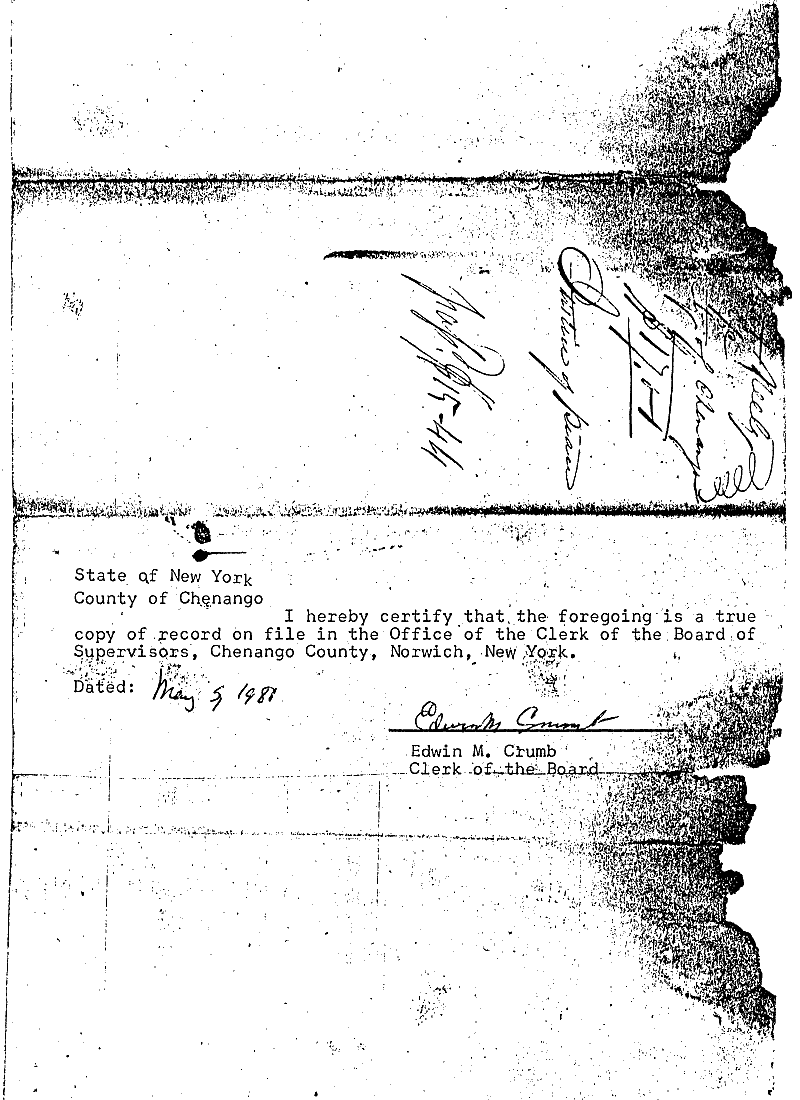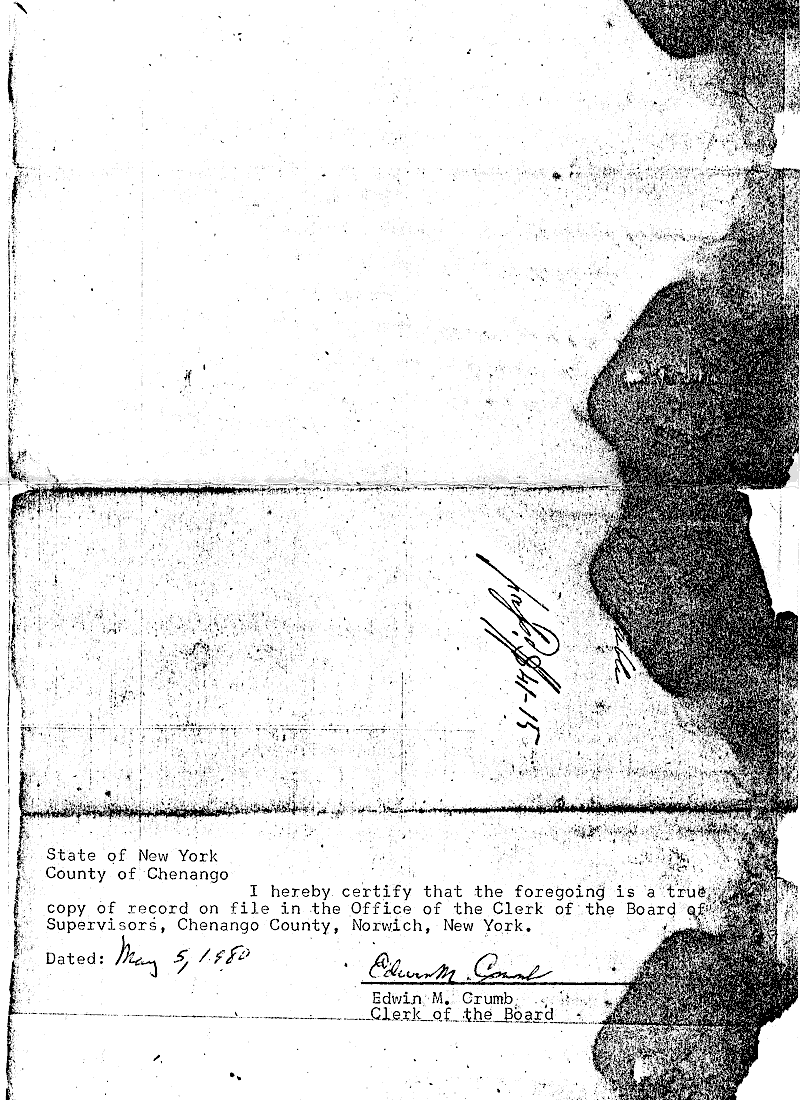JOSEPH E PROBLEMAS COM A JUSTIÇA
Joseph Smith enfrentou problemas com a justiça de do estado de Nova York. Este iniciou-se 1825, quando Joseph Smith Jr. foi contratado pelo fazendeiro Josiah Stowel, um visitante que estava convencido que havia tesouros em suas terras.
Como Stowel ouvira sobre a capacidade do jovem Smith em encontrar objetos perdidos, ele o contratou por 14 dólares por mês, mais estadia e alimentação. O pai de Joseph acompanhou seu filho de 19 anos nessa expedição.
A mãe de Joseph confirmou sua notoriedade como vidente e relatou como o Sr. Stowell atravessou o estado para contratá-lo:
"Um pouco antes da casa ser terminada [1825], um homem chamado Josiah Stoal [Stowell] veio do condado de Chenango, Nova York, com a intenção de ter Joseph como assistente para a escavação de uma mina de prata [na Pennsylvania]. Ele veio por causa de Joseph, pois ouvira falar que ele possuia certos meios pelos quais ele conseguia discernir coisas invisíveis para o olho natural"[1].
H. Michael Maquardt diz que ambos os pais de Joseph o contrataram por causa de sua pedra mágica. Eles falaram que Joseph eram mais do que uma ajuda para Stowell. Joseph Sr, por várias vezes falou que Joseph fora contratado
"sob o requisito de alguém que queria assistência de seus gravetos divinos e pedras, para encontrar tesouros perdidos, possivelmente enterrados por indios ou outros".
Nessa época, Joseph tinha 19 anos e seu pai, 44 [2]
O local da busca foi em Susquehanna Valey próximo à Damascus, Nova York. Vários homens apareceram para auxiliar na busca ao tesouro, esperando compartilhar do achado.
O trabalho progredia lentamente. Nos primeiros dias, os escavadores trabalharam com vontade, antecipando suas riquezas. Mas conforme eles cavavam e não encontravam nada, começaram a desanimar. Quando Joseph disse à eles que o tesouro começara a afundar por causa de encantamentos, eles suspeitaram que ele fosse um charlatão e perceberam que ele os tinha enganado.
Porém, em março de 1826, Peter Bridgman, um vizinho de Stowel fez uma queixa oficial contra Smith, que foi preso por ser um impostor e por perturbar a paz do local. Em 20 de março, aos 20 anos, Joseph foi à julgamento em Chenango County Courthouse, no caso “People of State of New York v. Joseph Smith [Povo do Estado de Nova Yourk contra Joseph Smith]”.
Imediatamente após estas cópias aparecerem no livro No Man Knows My History, de Fawn Brodie (a partir de cópias da corte de Bainbridge), os líderes mórmons declararam que se tratava de uma falsificação para desacreditar Joseph Smith (veja o Deseret News, Church Section, May 11, 1946). O apóstolo John A. Widtsoe afirmou:
"Este alegado registro de tribunal parece ser uma tentativa literária de um inimigo para ridicularizar Joseph Smith reunindo todos os boatos que havia naquela época fazendo parecer como se ele estivesse confessando isto...inclusive não há nenhuma prova de que houve tal julgamento" [3]
Os estudiosos mórmons continuaram a negar a autenticidade desta cópia até que, em agosto de 1971, no jornal Salt Lake City Messenger, foi anunciada uma importante descoberta sobre Joseph Smith. Ela foi feita por Wesley P. Walters, e tratava-se de documentos originais com mais de 140 anos. Esses documentos, encontrados em Norwich, Nova York, provam que Joseph Smith foi preso, julgado e condenado pela justiça em Bainbridge, Nova York.
Abaixo, encontra-se o conteúdo do documento:
STATE OF NEW YORK v. JOSEPH SMITH.
"Warrant issued upon written complaint upon oath of Peter G. Bridgeman, who informed that one Joseph Smith of Bainbridge was a disorderly person and an impostor."
"Prisoner brought before Court March 20, 1826. Prisoner examined: says that he came from the town of Palmyra, and had been at the house of Josiah Stowell in Bainbridge most of the time since; had small part of time been employed by said Stowel on his farm, and going to school. That he had a certain stone which he had occasionally looked at to determine where hidden treasures in the bowels of the earth were; that he professed to tell in this manner where gold mines were a distance under ground, and had looked for Mr. Stowel several times, and had informed him where he could find these treasures, and Mr. Stowel had been engaged in digging for them. That at Palmyra he pretended to tell by looking at this stone where coined money was buried in Pennsylvania, and while at Palmyra had frequently ascertained in that way where lost property was of various kinds; that he had occasionally been in the habit of looking through this stone to find lost property for three years, but of late had pretty much given it up on account of its injuring his health, especially his eyes, making them sore; that he did not solicit business of this kind, and had always rather declined having anything to do with this business. "Josiah Stowel sworn: says that prisoner had been at his house something like five months; had been employed by him to work on farm part of time; that he pretended to have skill of telling where hidden treasures in the earth were by means of looking through a certain stone; that prisoner looked for him sometimes; once to tell him about money buried in Bend Mountain in Pennsylvania, once for gold on Monument Hill, and once for a salt spring; and that he positively knew that the prisoner could tell, and did possess the art of seeing those valuable treasures through the medium of said stone; that he found the (word illegible) at Bend and Monument Hill as prisoner represented it; that prisoner had looked through said stone for Deacon Attleton for a mine, did not exactly find it, but got a p-----(word unfinished) of ore which resembled gold, he thinks; that prisoner had told by means of this stone where a Mr. Bacon had buried money; that he and prisoner had been in search of it; that prisoner had said it was in a certain root of a stump five feet from surface of the earth, and with it would be found a tail feather; that said Stowel and prisoner thereupon commenced digging, found a tail feather, but the money was gone; that he supposed the money moved down. That prisoner did offer his services; that he never deceived him; that prisoner looked through stone and described Josiah Stowel's house and outhouses, while at Palmyra at Simpson Stowel's, correctly; that he had told about a painted tree, with a man's head painted upon it, by means of said stone. That he had been in company with prisoner digging for gold, and had the most implicit faith in prisoner's skill. "Arad Stowel sworn; says that he went to see whether prisoner could convince him that he possessed the skill he professed to have, upon which prisoner laid a book upon a white cloth, and purposed looking through another stone which was white and transparent, hold the stone to the candle, turn his head to book, and read. The deception appeared so palpable that witness went off disgusted. "McMaster sworn; says he went with Arad Stowel, and likewise came away disgusted. Prisoner pretended to him that he could discover objects at a distance by holding this white stone to the sun or candle; that prisoner rather declined looking into a hat at his dark coloured stone, as he said that it hurt his eyes."
"Jonathan Thompson says that prisoner was requested to look for a chest of money; did look, and pretended to know where it was; and prisoner, Thompson, and Yeomans went in search of it; that Smith arrived at spot first; was at night; that smith looked at hat while there, and when very dark, and told how the chest was situated. After digging several feet, struck upon something sounding like a board or plank. Prisoner would not look again, pretending that he was alarmed on account of the circumstances relating to the trunk being buried, [which], came all fresh to his mind. That the last time he looked he discovered distinctly the two Indians who buried the trunk, that a quarrel ensued between them, and that one of said Indians was killed by the other, and thrown into the hole beside the trunk, to guard it, as he supposed."
Thompson says that he believed in the prisoner's professed skill; that the board which he struck his spade upon was probably the chest, but on account of an enchantment the trunk kept settling away from them while digging; that notwithstanding they continued constantly removing the dirt, yet the trunk kept about the same distance from them. Says prisoner said that it appeared to him that salt might be found at Bainbridge, and that he is certain that prisoner can divine things by means of said stone. That as evidence of the fact prisoner looked into his hat to tell him about some money witness lost sixteen years ago, and that he described the man that witness supposed had taken it, and the disposition of the money; "And therefore the court find the defendant guilty."
Costs: Warrant, 19c. Complaint upon oath, 25 1/2c. Seven witnesses, 87 1/2c. Recognisances, 25c. Mittimus, 19c. Recognisances of witnesses, 75c. Supoena, 18c.--$2.68."
Este julgamento foi publicado, na época, na Fraser's Magazine, fev. 1873, 229 - 230.
Antes que esta descoberta fosse feita, as autoridades de Igreja disseram isto:
"Um estudo cuidadoso de todos os fatos a respeito desta alegada confissão de Joseph Smith em um tribunal, que ele tinha usado uma pedra de vidente para achar tesouros escondidos de modo fraudulento, deve chegar à conclusão que nunca ouve tal registro e portanto, nunca aconteceu...se existisse alguma evidência de que Joseph Smith usou uma pedra de vidente para praticar fraude e engano, especialmente se tivesse feito esta confissão em um tribunal já em 1826, ou quatro anos antes do Livro de Mórmon ser impresso, e se essa confissão estivesse em um registro de tribunal, teria sido impossível para ele ter organizado a Igreja restaurada. Se um registro do tribunal pudesse ser identificado, e se ele contiver uma confissão de Joseph Smith, que revele que ele é um ignorante, pobre, iludido e uma pessoa supersticiosa, que ele próprio é incapaz de escrever um livro com qualquer consequência, e cuja Igreja não aguentaria porque atrairia apenas pessoas de semelhantes de baixa mentalidade... se talconfissão registrada na Corte pudesse ser identificada e provada, em seguida seus fiéis deveriam negar sua alegada orientação divina,que os levou a segui-lo ... Como ele poderia ser um profeta de Deus, o líder da Igreja restaurada para estas dezenas de milhares, se ele fosse uma fraude supersticiosa cujas páginas de um livro declaram que ele confessa ser?..." Fonte: A New Witness For Christ In |
 |
| Declaração do erudito Francis W. Kirkham, publicada no A New Witness For Christ In America, Salt Lake City: Vol. 1, 385-387. |
Bem, apesar de 140 anos de silêncio, os registros vieram à tona. O Rev. Wesley Walters descobriu os documentos no porão do Município de Chenango, Nova York, jailhouse em Norwich, NY em 1971.
 |
| Joseph Smith condenado no caso Stowell |
Os documentos, depoimentos e outros dados mostram conclusivamente que Joseph Smith foi preso, foi a julgamento e foi devidamente condenado como um impostor no caso de Stowell e da Pedra do Vidente. Não é uma questão de debate, opinião ou preferência religiosa. É um fato histórico comprovado.
A seguir, encontram-se as reproduções fotográficas do documento do juiz Albert Neeley mostrando o processo e os custos envolvidos em vários julgamentos em 1826. O quinto ítem menciona o julgamento de "Joseph Smith, o Adivinhador.
Veja as reproduções abaixo:
Documento 3: Custos do Juiz de Paz Phillip De Zeng
Documento 3: Verso do documento do Juiz Neely com autenticação
Documento 4: Verso do documento do Juiz de Paz De Zeng com autenticação
É claro para mim e milhões de outras pessoas, Joseph Smith foi um vigarista condenado, mas para alguns nunca haverá provas suficientes para fazerem essa conexão. Não porque a evidência não é boa o suficiente, mas porque eles não se permitem admitir que o seu amado profeta realmente era mentiroso e ladrão.
IR PARA SUMÁRIO
3 - Joseph Smith—Seeker After Truth, Salt Lake City, 1951, p.78.
____________________________________
NOTAS:
1 - For discussion of Joseph Sr.'s use of a divining rod as well as his involvement in treasure-seeking in and around Manchester, New York, see Quinn 1987, 28-32, 36, 43, 57-58, 85, 86, 112, 209-10. See also I.G.1, JESSE SMITH TO HYRUM SMITH, 17 JUN 1829; III.J.2, ORSAMUS TURNER ACCOUNT, 1851, 214; III.A.14, WILLARD CHASE STATEMENT, CIRCA 11 DEC 1833, 240; III.A.9, PETER INGERSOLL STATEMENT, 2 DEC 1833, 232-33; III.A.13, WILLIAM STAFFORD STATEMENT, 8 DEC 1833, 237-38; and III.J.8, POMEROY TUCKER ACCOUNT, 1867, 20-21.
1 - For discussion of Joseph Sr.'s use of a divining rod as well as his involvement in treasure-seeking in and around Manchester, New York, see Quinn 1987, 28-32, 36, 43, 57-58, 85, 86, 112, 209-10. See also I.G.1, JESSE SMITH TO HYRUM SMITH, 17 JUN 1829; III.J.2, ORSAMUS TURNER ACCOUNT, 1851, 214; III.A.14, WILLARD CHASE STATEMENT, CIRCA 11 DEC 1833, 240; III.A.9, PETER INGERSOLL STATEMENT, 2 DEC 1833, 232-33; III.A.13, WILLIAM STAFFORD STATEMENT, 8 DEC 1833, 237-38; and III.J.8, POMEROY TUCKER ACCOUNT, 1867, 20-21.
3 - Joseph Smith—Seeker After Truth, Salt Lake City, 1951, p.78.







(Vigarista, mentiroso e ladrão)
ResponderExcluirJoseph Smith admitiu que neste período, havia cometido atos que eram incompatíveis com o suposto chamado profético. Não sou um mórmon alienado ou adorador de Joseph, mas vale lembrar que ele admitiu suas falhas. E isso mostra que alguém vigarista, mentiroso e ladrão, pode ser tornar em uma pessoa muito mais agradável que alguns pseudo-intelectuais copiadores de informação. =/
Classificados
ResponderExcluirO problema não é um indivíduo ser, como vc citou, um vigarista, mentiroso e ladrão, mudar e se tornar uma pessoa do bem.
O problema é, enquanto ela se auto-intitula "profeta de Deus", agir como vigarista, mentiroso e ladrão. Dai sabemos que algo muito, muito errado está acontecendo. Ou Deus nào é onisciente ou esse "profeta" nõa é profeta coisa nenhuma!